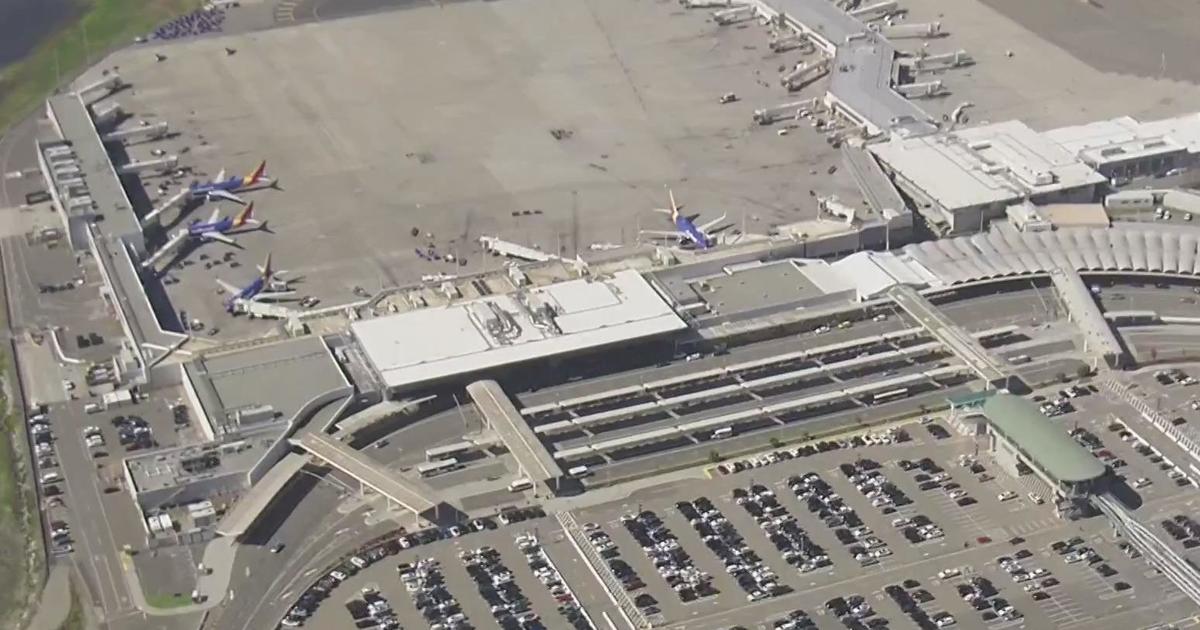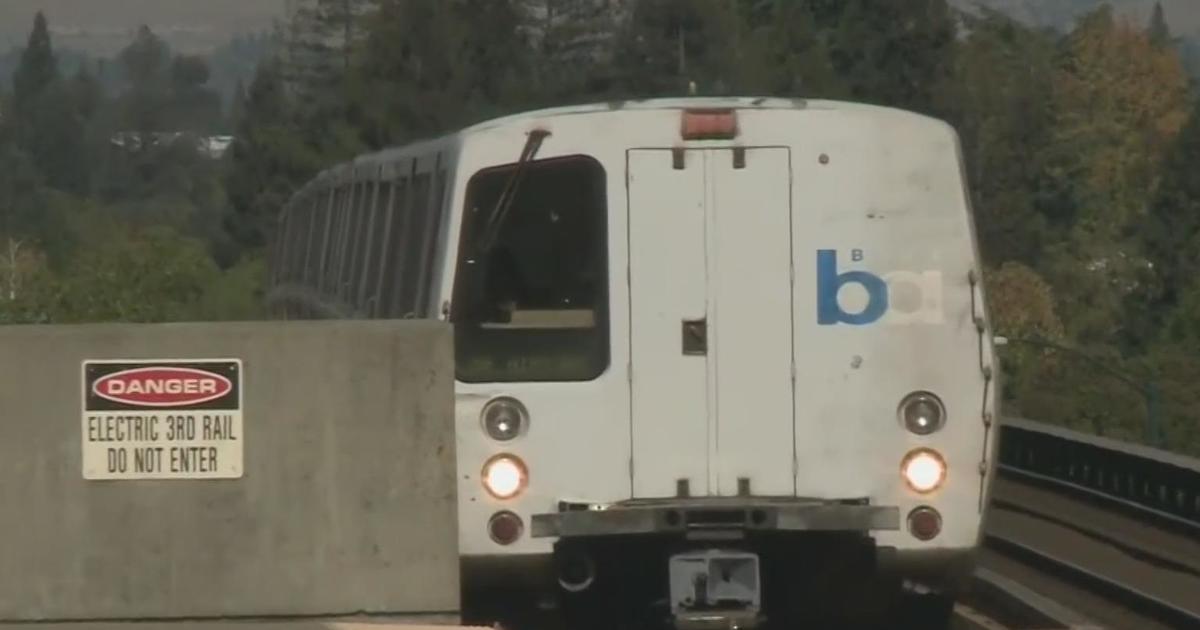Bay Area Forever Changed As Planeful Of Babies From Saigon Lands During Live Broadcast 40 Years Ago
(KPIX 5) -- A new exhibit opening at the San Francisco Presidio revolves around a historic event that occurred 40 years ago: a dramatic airlift that removed thousands of Vietnamese orphans from their war-torn country. The airlift also played a role in Bay Area television history.
On April 2nd, 1975, late at night, a plane touched down at Oakland International Airport. That night, then anchor Stan Bohrman was on duty. He was seated with chief sports anchor Wayne Walker. While the other television stations were recounting the news by talking to their reporters and relaying the information by phone, KPIX was the first and only broadcast station in the Bay Area with the technical capability of going live from a remote location.
"Oh, Okay Wayne.... Let's check back in with Andy Park," said Bohrman. At the airport, KPIX reporter Andy Park breathlessly described what he was seeing unfold in front of his eyes in a rare moment of television history.
"What you see is what you get," Park replied, "it's happening right now, the kids are arriving right now."
Onboard the World Airways cargo plane were 57 orphans, including a healthy little baby girl who was soon to be adopted by Marilyn and Ralph Norberg.
"We heard there was a Vietnamese baby girl that needed a home," said Marilyn Norberg.
"All of sudden we got a phone call that she was on her way," said Ralph Norberg.
The couple named her Wendy.
"I remember people telling me. It was a big event landing in the Bay Area," said Wendy Norberg
With the North Vietnamese military marching south, and Saigon about to fall, several orphanages in South Vietnam were desperate. There was particular concern about orphans who were "Amerasian," the product of Vietnamese women and U.S. soldiers.
Ross Meador worked at Friends of Children of Vietnam, one of the U.S. Voluntary Agencies authorized to process adoptions for American couples.
Meador said panic filled the air, and that he was searching for a way to get his kids to the U.S.
"There was genuine panic. Our next door neighbor came to us and showed us the poison he had purchased and said if we don't get out of the country, my wife and I have decided that we're going to kill ourselves," recounted Meador.
Meador searched for days looking for a plane to take them out of the country.
"We couldn't have abandoned them in the house, tried to turn them over to the government, there was no government," said Meador, "We had to bring the kids with us,"
His kids got on the first flight out: an unauthorized flight on World Airways, headed up by its president, the legendary hard drinking and flamboyant Edward Daly.
"It was 9 or 10 o'clock at night and all the kids had gone to bed," said Meador when Daly called him and said get the kids to the airport. Meador got them up and on a bus, and sung "California Here I Come," all the way to the airport.
The U.S. government tried to stop Daly from taking the orphans out, and the airport actually turned off its runway lights to stop the plane as it taxied for takeoff.
But Daly and his crew would not be deterred. "Ed Daly said 'Oh yeah, just watch me,'" said Meador laughing, "...and the flight took off."
The flight landed in Japan for refueling, and then arrived at Oakland International Airport.
The next day, then President Gerald Ford authorized $2 million to start Operation Babylift in earnest. The first authorized flight - the second airlift - ended in tragedy, crashing right after takeoff and killing a third of the orphans and staff.
The next authorized flight landed at San Francisco International Airport.
President Ford arrived to greet the plane and took an infant off.
In roughly a month, the mass evacuation involved dozens of flights and brought 2,600 children out of Vietnam.
The vast majority were processed at the Presidio Army base in a building known as Harmon Hall. Thousands of volunteers from around the Bay Area came to help, including a group of Vietnam Veterans known as the Flower of the Dragon. Lonny Weissman was one of them.
"There was literally mountains and mountains of diapers we had to deal with," said Weissman.
Weissman was an Army medic who was injured during the war. He remembers trying to fix badly wounded soldiers in the field. All of a sudden, he was at the Presidio tending to these tiny little babies.
"Going to the Presidio and doing that, I honestly believe that it made it possible for more healing to happen to me than anything I've done since." said Weissman
Among the babies he likely cradled, musician and singer Lara Price. Price was soon adopted by an Air Force family but she recently learned how vets like Weissman were on hand when she was so tiny and vulnerable.
"They weren't welcomed with the kind of honor they should have been that's one thing that I think people should know they were there to help us," explained Price.
But Operation Babylift was not without controversy.
"Many of the children with the orphan airlift were not orphans," contended Tom Miller, an East Bay Attorney
Miller filed a class action lawsuit along with other attorneys in April 1975 to determine who was eligible for adoption.
His wife T.T. Nhu had also volunteered at the Presidio as a Vietnamese interpreter. She said many of the orphans told her that they had parents back home.
Miller said some parents who gave their kids up, did so under duress, or just wanted to get them out of Vietnam and to safety of the U.S.
The case dragged on for years. Finally, Miller explained, even though INS sided with the lawsuit, that the court did not.
"The district court judge threw the whole case out as class action saying it was too complicated and sealed the records," said Miller.
But he has some information on all the orphans in a file in his office. He said orphans who are interested in learning about their true identities in Vietnam can file a Freedom of Information Act to request their INS files. If they know their truth birth name and date of birth, they can also contact him to see if he can help them - pro bono.
"If we can help in some small way, I'd be happy to do it," said Miller.
However, other orphans involved in the babylift are finding new ways to discover their roots. It's a project called Operation Reunite. The idea: to donate blood to a database in hopes of locating relatives or cousins. Every year, the woman who runs the database retrieves dozens of samples from individuals in Vietnam who are still seeking their children. The database is growing.
EXPLORE MORE:
- New Exhibit at Presidio presidioofficersclub.com/exhibits/special-exhibits
- Operation Reunite operationreunite.org
- Lara Price laraprice.com
- Tom Miller milwaki.com
- Flower of the Dragon https://www.facebook.com/pages/FLOWER-OF-THE-DRAGON/277886167306
- Watch KPIX 5's special, FLIGHT FROM SAIGON: 40 YEARS LATER, on April 30th, 2015
One of the orphans who came over in the babylift decided to participate.
"I wanted to know some of my missing pieces." said Tricia Houston. Houston was adopted by a couple in Orange County.
Today she teaches elementary school and is well loved by her students. Houston's parents gave her a copy of all of her documents when she turned 21.
Inside was a true copy of her birth certificate. Her mother was a Vietnamese maid who dropped Tricia off at an English school, The documents explain how her biological mother told the school that Tricia's father was an American soldier and that she could not take care of the terribly malnourished baby. The school could not take care of her as well, since she was so underweight and very sick. They brought her to an orphanage where was a medical clinic.
Houston decided to find out more about ethnicity, since the documents said her father was an American. She took a DNA test as part of Operation Reunite. The results shocked her and her family: She was 100% Asian: Southeast Asian.
Not only that, but a Vietnamese man - who had taken the same test - the results of which were now in the database - turns out to be her true biological father.
She just returned from visiting him for the first time. Regardless, she still considers her adoptive mom the true parent. He had been looking for her for years. He sent Houston's adoptive mom a gift and letter, thanking her for taking such good care of her.
"I'm alive and I have been loved, and that's because of my mom." said Houston.
Price is about to take the same DNA test to find out more about her background. She and Weissman have become friends. He and his wife often hear her sing at concerts. It's been a healing journey for all.
"People like Lara just make this country better," said Weissman
And while some still think the Babylift was a band aid put on an unpopular war, the orphans with whom KPIX spoke felt otherwise: "I always felt incredibly blessed," said Price, adding she was living the American Dream.
"I know the reality of if I had stayed in Vietnam I would have probably died," said Houston. "I view myself as having both feet in America, both feet firmly in America," said Norberg.
"It was the greatest humanitarian effort of the 20th century", said Meador. He was proud to be part of it.



